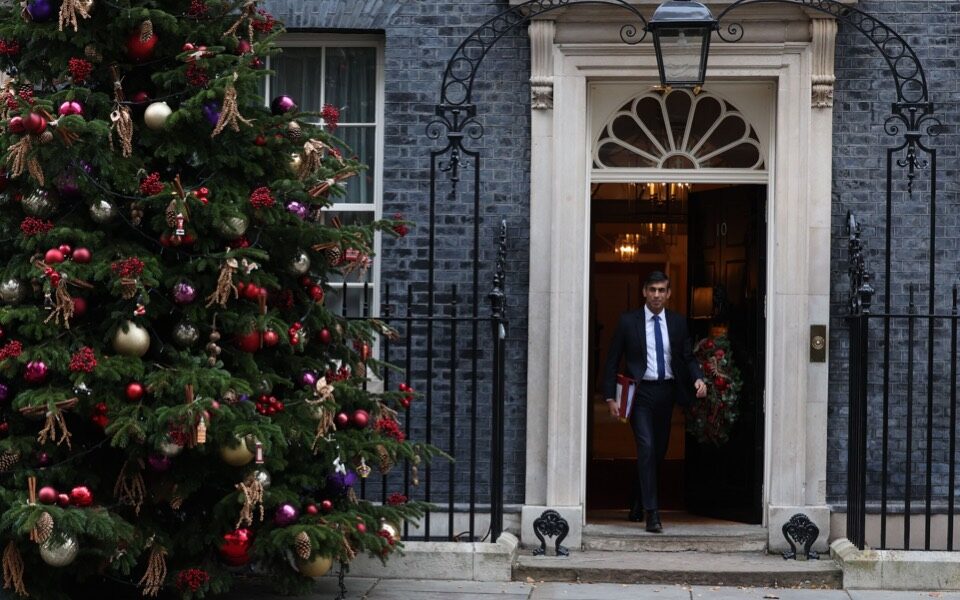Sunak’s snub makes no sense, says British analyst

The Greek prime minister “paid for” the Tory collapse in public opinion polls, according to British analyst Simon Nixon.
Speaking to Kathimerini, he explains British Prime Minister Rishi Sunak’s decision to cancel his meeting with his Greek counterpart, Kyriakos Mitsotakis, was all the more surprising considering that new Foreign Secretary David Cameron had only days earlier said “he wanted to pursue closer ties with the European Union.”
A seasoned former commentator at the Times and the Wall Street Journal, Nixon believes that a Labour Party government would agree to return the Parthenon Sculptures so long as such a deal would not give Greece legal ownership over them.
 How do you assess the British prime minister’s decision to cancel the meeting? Did Mitsotakis’ statements justify his reaction?
How do you assess the British prime minister’s decision to cancel the meeting? Did Mitsotakis’ statements justify his reaction?
It is fair to say that there has been widespread incredulity in British political and media circles at Rishi Sunak’s decision to cancel the meeting with Kyriakos Mitsotakis. None of the explanations briefed to journalists stands up to scrutiny. Downing Street claimed that the Greek prime minister had broken a commitment not to talk about the return of the Parthenon Sculptures while he was in Britain. But even if that was true, which Greek officials say it is not, the decision came nearly 36 hours after Mitsotakis had appeared on British television where he had answered a question on the Parthenon Sculptures by repeating the position of every Greek government for 40 years.
Nor does it make sense that Sunak snubbed the meeting because he was irked by Mitsotakis’ decision to meet with Sir Keir Starmer, the leader of the Labour Party, on Monday night. Downing Street would have been well aware of his plans and in any case can hardly have been surprised that Mitsotakis wanted to meet the man who is 20 points ahead in the polls a year before the election and the likely next prime minister. What makes the decision to cancel the meeting all the more surprising is that it comes just days after David Cameron, the former prime minister and newly appointed foreign secretary, said that he wanted to pursue closer ties with the European Union.
What are the possible internal political reasons that led Sunak to his move?
It is possible that Sunak was motivated simply by personal pique. He has a reputation for being irritable. But more likely this was a deliberate ploy to divert attention from his dire political situation. He is under extreme pressure from his own side after his flagship immigration policy to deport asylum seekers to Rwanda was ruled illegal by the Supreme Court. A tax-cutting budget last week failed to shift the polls after it became clear that the tax burden would in fact continue to climb and that growth could continue to flatline. Voters seem in no mood to forgive the Conservatives for 13 years that have left the economy and public services in a dismal state.
‘None of the explanations briefed to journalists stands up to scrutiny’
In this context, Sunak’s decision to pick a fight with Greece over the Parthenon Sculptures looks like yet another Conservative attempt to reignite a culture war in which Sunak can present himself as a patriotic defender of Britain’s artistic treasures. Whether this is a wise fight for Sunak to pick is an open question. Polls suggest that the public supports returning the sculptures to Greece. They are seen as an integral part of the world’s most important archaeological site and should be displayed in their entirety alongside the rest of the friezes in the Acropolis Museum in Athens. Sunak may also have underestimated the historic strength of British Hellenism.
Do you think a Labour government would take a different stance on the sculptures issue?
Labour has said that it will not stand in the way of a deal between the British Museum and Greece. What seems less likely is that a Labour government would agree to an act of parliament that handed formal legal ownership of the sculptures to Greece. Since a deal is rumored to be close, that means the sculptures could be returning to Athens sooner rather than later.





